By Clare ThorpFeatures correspondent

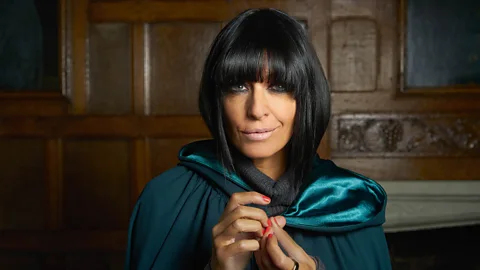 Getty Images
Getty Images
It’s dominating ratings – and cultural conversations – around the world: murder mystery-cum-reality TV phenomenon The Traitors has proved a hit because it taps into our obsession with liars. Why are we so fascinated by deceit?
In an era in which our TV viewing habits are so fractured, genuine watercooler moments feel increasingly rare. So it’s always pleasing when a show comes along and unites people – even when that unification involves screaming at our TV sets or sending a string of shocked face emojis to our group chats. Such is the case with The Traitors, the murder-mystery game-meets-reality show hybrid that has become the most compulsive show on TV.
More like this:
– The greatest reality TV show never made
Originating – like many popular reality TV formats – in The Netherlands, The Traitors premiered in the UK in late 2022, with the US edition first airing in early 2023. The show became a word-of-mouth hit and its success has continued to grow. Now midway through its second season, The Traitors US is now the most-watched reality show in the country across all streaming platforms – with figures up 75% on the first season. The UK edition, which wrapped up its second season last month, dominated not just the country’s TV screens in its primetime BBC1 slot (more than doubling the audience of the first season) but the cultural conversation, too. The show has also made waves in Australia and been licensed in multiple other countries.
At a time when reality TV was starting to feel staid, with interest and viewing figures steadily waning, The Traitors has breathed new life into the format. Large helpings of treachery and deceit are its main selling points – and viewers can’t get enough.

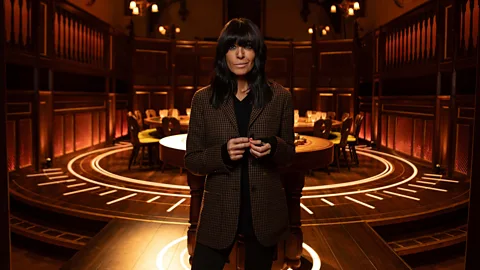 Getty Images
Getty Images
The concept of the show involves a group of contestants within which a select handful are secretly anointed “traitors”. The rest of the group remain “faithful” and must try to identify the traitors and oust them at a round-table ritual. Meanwhile the traitors convene to “murder” a faithful each night. If the remaining faithfuls weed out all traitors by the end, they split the cash prize. If any traitors are left, they pocket the lot.
Each country puts their own spin on events. The UK and the US editions are both filmed in the same Scottish castle, and involve similar tasks (contestants boost their prize money by winning challenges) but feel very different. In the UK, the cast are “unknowns”, a brilliant diverse mix of mostly likeable normal people. The casting is part of the appeal – it feels like a return to the days when reality TV felt more like a social experiment than an audition for wannabe influencers.
In contrast, the latest US series features a greatest hits of reality stars from shows including The Real Housewives, Survivor, Love Island and Big Brother (the first season had a mix of celebrities and unknowns – but they’ve now ditched the muggles completely). These are people who know how to amp it up for the cameras. As a result, it’s vicious, ruthless – and gloriously camp.
A show like The Traitors gives the viewer a bird’s eye view of the deceit. We know who is lying and to whom
On the UK version, the nastiest it got – in plain sight at least – was criticising someone’s roast dinners. In the US edition, a contestant will happily announce “no one likes you” to someone’s face or – as contestant Kate Chastain did to Rachel Reilly in season one – tell them their clothes look like they’re from a community-theatre costume bucket (Chastain, best known for being head steward on yacht-based reality series Below Deck, caused such compelling chaos that she’s been brought back in season two). As host Alan Cumming – sporting a different beret each episode – says: “In this game there’s no BFFs, unless BFF stands for betrayers, fakes and fraudsters.”

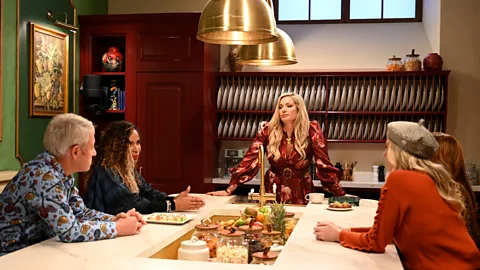 Getty Images
Getty Images
This duplicity is exactly what makes it so compelling to watch – but why are we so fascinated by deception? “One theory is that watching reality TV allows us to engage in a hyperreality,” explains sociologist Danielle Lindemann, author of True Story: What Reality TV Says About Us. “It’s like our own lives but more extreme, a funhouse where everything is accentuated. We all know liars in our lives, but probably not to this extreme.”
A show like The Traitors gives the viewer a bird’s eye view of the deceit. We know who is lying and to whom. We can see what people are saying behind each other’s backs, and the barefaced lies they’re telling to their faces. We can also tear our hair out over how they are falling for it. Because we would never be so stupid, right?
In fact, research shows that humans are much worse at detecting lies than we think we are – and The Traitors is testament to this. As the current season of The Traitors US kicked off, the faithful wasted no time putting their deduction skills to use. One contestant, Bergie from Love Island USA, was immediately marked out for suspicion because he had red cheeks and talked fast. John Bercow – the British former speaker of the House of Commons – was interrogated over some heavy breathing (which turned out to be asthma ). “I’m very good at catching people who lie,” said faithful Ekin Su, from Love Island UK, in episode four, not realising she’d already been “poisoned” by a traitor and was about to partake in her own elaborate funeral.
False flags
Staying too quiet, talking too much, possessing too much confidence or not enough, a funny look, an inappropriate giggle… all these can send the faithful on a wild goose chase as they try to pin down a traitor. Meanwhile, one of the actual traitors effortlessly throws people off the scent just by playing dumb and proclaiming “If there was really a mastermind, it sure wouldn’t be a dolled-up Housewife, baby.”
“We often watch reality TV to feel superior to the people on the shows,” says Lindemann. “We can see what’s happening and we know what’s to come, but the people on the show don’t. It can give us this sense of smug superiority, like ‘why didn’t you see what they did there?’ When in actuality it’s really not that obvious. They don’t have a lot of clues to go on.”

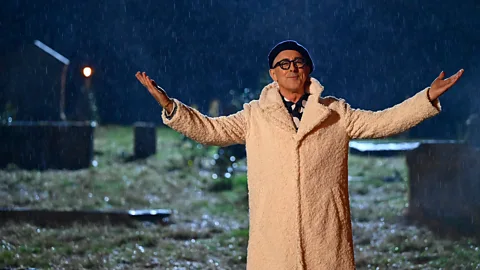 Getty Images
Getty Images
As a viewer, it’s also fun to watch liars get caught. “In our own lives we might know liars who are not getting their comeuppance, so we can live vicariously through the people on the show who do,” says Lindemann. Or maybe we’re egging the traitors on, wanting to see just how far they can push their deception. “It’s another way of living vicariously,” says Lindemann. “They get to do all the deviant behaviour we can’t.”
Our fascination with liars isn’t limited to reality television. We can’t resist documentaries like The Tinder Swindler (again, we would never fall for those lies ourselves). Then there’s the spate of dramas based on real-life scammers, like Inventing Anna, The Dropout and The Act. Fictional stories about fraudsters are irresistible, too – see the excitement for Netflix’s upcoming Ripley, based on Patricia Highsmith’s novel The Talented Mr Ripley.
But reality TV lends itself uniquely to liars and fraudsters, with its most seismic moments involving lies and betrayals. Like Vanderpump Rules’ “Scandoval” – where longtime cast member Tom Sandoval was revealed to be cheating on his girlfriend with a co-star. Or the (now in retrospect rather quaint) “Nasty Nick” scandal of the first season of Big Brother UK, where Nick Bateman wrote secret notes to players to try and sway their voting intentions.

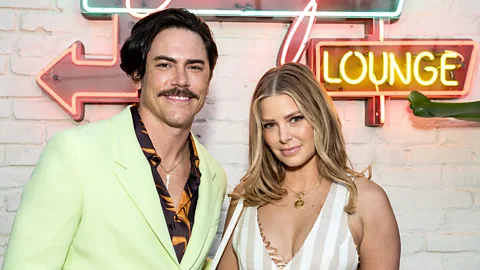 Getty Images
Getty Images
“Deception has always been woven into the fabric of reality TV,” says Lindemann. “People know that reality TV is not completely 100% real but that doesn’t halt our enjoyment of it.”
As reality TV has felt less authentic, it’s also become increasingly problematic. Last year, lawyers for current and former cast members of NBC reality shows accused TV producers of subjecting its stars to “grotesque and depraved mistreatment”. Knowing that shows might be prioritising good TV over the welfare of their cast members can make for an increasingly uncomfortable viewing experience.
So perhaps it makes sense that viewers are embracing a show that makes no bones about encouraging contestants to stab each other in the back. On The Traitors, both contestants and audiences know what they are in for. No one can – or at least, should – get mad at the game.
In the social media age, it’s hard to escape dishonesty. Many of us craft a version of ourselves to present to the world online, one that might not always completely reflect reality. We’ve become comfortable with an element of deception in our lives, but we still want to feel like the good guys.
“We watch reality TV to gawk at the deviants, the people who are not playing by society’s rules, and liars fall into that category,” says Lindemann. “One of the pleasures of that is to symbolically distance ourselves from the deviants. Even though we’re all deviant in our own ways, at least we’re not like that awful person. At least we’re not a traitor.” When we watch liars on TV, we can console ourselves that we’ll never be as deceitful as that in our everyday lives. Honest.
If you liked this story, sign up for The Essential List newsletter – a handpicked selection of features, videos and can’t-miss news delivered to your inbox every Friday.
If you would like to comment on this story or anything else you have seen on BBC Culture, head over to our Facebook page or message us on Twitter.





